Tsar Nicholas II

Nicholas Alexandrovich Romanov was born May 18, 1868 (NS) to Tsar Alexander III and Empress Marie Fedorovna of Russia.
Nicholas II became Emperor and Autocrat of all the Russias, Tsar of Moscow, Kiev, Vladimir, Novgorod, Kazan, Astrakhan, of Poland, of Siberia, of Tauric Chersonese, of Georgia, Lord of Pskov, Grand Duke of Smolensk, of Lithuania, Volhynia, Podolia and Finland, Prince of Estonia, Livonia, Courland and Semigalia, Samogotia, Bialostock, Karelia, Tver, Yougouria, Perm, Viatka, Bulgaria, and other countries; Lord and Grand Duke of Lower Novgorod, of Tchernigov, Riazan, Polotsk, Rostov, Yaroslav, Belozero, Oudoria, Obdoria, Condia, Vitebsk, Mstislav and, all the region of the North, Lord and Sovereign of the countries of Iveria, Cartalinia, Kabardinia and the provinces of Armenia, Sovereign of the Circassian Princes and the Mountain Princes, Lord of Turkestan, Heir of Norway, Duke of Schleswig Holstein, of Storman, of the Ditmars, and of Oldenbourg on November 1, 1894 (NS) at the age of 26, upon the death of his father Tsar Alexander III. He was not crowned Tsar in Moscow until May of 1896 after the 12 month mourning period.
Before Alexander III had passed away, he gave his consent to the marriage of the heir to the throne to Nicholas' own choice, Princess Alix of Hesse.
Unlike the majority of royal couples, Nicholas and Alexandra were genuinely in love, much to the chagrin of his father, Alexander III and his mother, Empress Marie, who favored a more political match for Russia's future to that of the unpopular German princess.
Nicholas was an obedient son, however, he wished nothing more than to marry Alix of Hesse-Darmstadt and refused any prospective brides his parents suggested. Nicholas wrote hundreds of passionate love letters to Alix during their engagement and many more after they married. In his letters he referred to himself as the "old cow."
Nicholas had a close relationship with his younger brother Georgy, who moved to the warmer, drier climate as a young adult because of tuberculosis. Nicholas missed him dearly and wrote him often. Nicholas'letters were playful, warm and cheery - once referring to Queen Victoria as "belly woman." Nicholas was devastated after the premature death of Georgy in 1899. Both Nicholas and Alexandra were very familiar with death, which made the reality of losing their son all too real. They both affirmed, "Thy will be done" and prayed fervently for their boy and for Russia.

Nicholas II and King George V of England
Nicholas, as you can see from the above picture, resembled his first cousin (through his mother's sister), King George, V of England. Nicholas was short in stature and well liked by those who knew him personally. He was extremely bright and grasped concepts quickly, despite what some of the history books about WWI say. He was extremely polite and disliked confrontation.
Nicholas felt it was his duty to rule Russia as well as reign. This meant that he would have to make all the decisions for the country with brief input in the form of reports from the ministers that served him. He would not meet with them all at once, which would increase communication with the Emperor and each other, but only on an individual basis. This hampered effectiveness greatly. He had an impeccable memory and a great mind for detail. His office was meticulous and did not like anyone touching his papers. Thus Nicholas did not have a secretary to assist him with the enormous load of paperwork that came across his desk daily.
Because of his dislike and avoidance of conflict, he would commonly agree with the last minister that spoke with him, then would do what he liked afterwards. This made him appear indecisive. The members of Nicholas II's court found him infuriatingly indecisive and passive as well.
Many people outside the tight family circle were not aware of the tsarevitch's illness and therefore did not understand Nicholas' reasons for the decisions he made. The biggest example was that of the smelly, unkept, verbally abusive alcoholic peasant, Rasputin. Rasputin, it seemed, had easy access to the palace when other, well-bred royalty could not obtain an audience with the Emperor or Empress. This alienated the Imperial couple even more from the support of the court that they would desperately need during the Revolution. (Rasputin has baffled experts for nearly 100 years with his remarkable healing abilities).
Nicholas felt he was God's annointed to rule Russia and took his role very seriously. Nicholas believed that he did not have to explain himself to ANYONE on earth, and that he only had to answer to God. He was extremely spiritual in nature as were his wife and children.
It was said that Nicholas never looked more relaxed than he did when he abdicated. This could be attributed to his love of walking and being outdoors and spending his days with his beloved family. Two activities that were limited as reigning emperor.
Nicholas believed that all that happened to him was God's will and therefore, never attempted to alter what he considered his fate. He was born on the Feast of St. Job (If you know your Bible, you know that Job was a faithful child of God whom the devil made suffer in attempts to get him to curse the Lord for his plight. Job never did, and neither did Nicholas). Nicholas believed that he was meant to suffer.
Today, Nicholas II, Alexandra, and all their children are considered martyrs in the Russian Orthodox Church for their devotion and exemplary lifestyle dedicated to Christ the Lord.

Alexandra | Olga | Tatiana | Marie | Anastasia | Alexei